- Home
- Robert E. Howard
Sword Woman and Other Historical Adventures Page 40
Sword Woman and Other Historical Adventures Read online
Page 40
“This to me, dog?” yelled the Sultan. “I will fry you in oil!”
“Aye, prove your power over Timour by slaying the dog he mocked,” answered MacDeesa bitterly. “You kings are all alike in fear and folly.”
Bayazid gaped at him. “By Allah!” he said, “thou’rt mad to speak thus to the Thunderer. Bide in my court until I learn whether thou be rogue, fool, or madman. If spy, not in a day or three days will I slay thee, but for a full week shalt thou howl for death.”
So Donald abode in the court of the Thunderer, under suspicion, and soon there came a brief but peremptory note from Timour, asking that “the thief of a Christian who hath taken refuge in the Ottoman court” be given up for just punishment. Whereat Bayazid, scenting an opportunity to further insult his rival, twisted his black beard gleefully between his fingers and grinned like a hyena as he dictated a reply, “Know, thou crippled dog, that the Osmanli are not in the habit of conceding to the insolent demands of pagan foes. Be at ease while thou mayest, oh lame dog, for soon I will take thy kingdom for an offal-heap and thy favorite wives for my concubines.”
No further missives came from Timour. Bayazid drew Donald into wild revels, plied him with strong drink and even as he roared and roistered, he keenly watched the Highlander. But even his suspicions grew blunter when at his drunkest Donald spoke no word that might hint he was other than he seemed. He breathed the name of Timour only with curses. Bayazid discounted the value of his aid against the Tatars, but contemplated putting him to use, as Ottoman sultans always employed foreigners for confidants and guardsmen, knowing their own race too well. Under close, subtle scrutiny the Gael indifferently moved, drinking all but the Sultan onto the floor in the wild drinking-bouts and bearing himself with a reckless valor that earned the respect of the hard-bitten Turks, in forays against the Byzantines.
Playing Genoese against Venetian, Bayazid lay about the walls of Constantinople. His preparations were made: Constantinople, and after that, Europe; the fate of Christendom wavered in the balance, there before the walls of the ancient city of the East. And the wretched Greeks, worn and starved, had already drawn up a capitulation, when word came flying out of the East, a dusty, blood-stained courier on a staggering horse. Out of the East, sudden as a desert-storm, the Tatars had swept, and Sivas, Bayazid’s border city, had fallen. That night the shuddering people on the walls of Constantinople saw torches and cressets tossing and moving through the Turkish camp, gleaming on dark hawk-faces and polished armor, but the expected attack did not come, and dawn revealed a great flotilla of boats moving in a steady double stream back and forth across the Bosphorus, bearing the mailed warriors into Asia. The Thunderer’s eyes were at last turned eastward.
IV
“The deer runs wild on hill and dale,
The birds fly wild from tree to tree;
But there is neither bread nor kale,
To fend my men and me.”
– The Battle of Otterbourne
“Here we will camp,” said Bayazid, shifting his giant body in the gold-crusted saddle. He glanced back at the long lines of his army, winding beyond sight over the distant hills: over 200,000 fighting men; grim janizaries, spahis glittering in plumes and silver mail, heavy cavalry in silk and steel; and his allies and alien subjects, Greek and Wallachian pikemen, the twenty thousand horsemen of King Peter Lazarus of Serbia, mailed from crown to heel; there were troops of Tatars, too, who had wandered into Asia Minor and been ground into the Ottoman empire with the rest – stocky Kalmucks, who had been on the point of mutiny at the beginning of the march, but had been quieted by a harangue from Donald MacDeesa, in their own tongue.
For weeks the Turkish host had moved eastward on the Sivas road, expecting to encounter the Tatars at any point. They had passed Angora, where the Sultan had established his base-camp; they had crossed the river Halys, or Kizil Irmak, and now were marching through the hill country that lies in the bend of that river which, rising east of Sivas, sweeps southward in a vast half-circle before it bends, west of Kirshehr, northward to the Black Sea.
“Here we camp,” repeated Bayazid; “Sivas lies some sixty-five miles to the east. We will send scouts into the city.”
“They will find it deserted,” predicted Donald, riding at Bayazid’s side, and the Sultan scoffed, “Oh gem of wisdom, will the Lame One flee so quickly?”
“He will not flee,” answered the Gael. “Remember he can move his host far more quickly than you can. He will take to the hills and fall suddenly upon us when you least expect it.”
Bayazid snorted his contempt. “Is he a magician, to flit among the hills with a horde of 150,000 men? Bah! I tell you, he will come along the Sivas road to join battle, and we will crack him like a nutshell.”
So the Turkish host went into camp and fortified the hills, and there they waited with growing wrath and impatience for a week. Bayazid’s scouts returned with the news that only a handful of Tatars held Sivas. The Sultan roared with rage and bewilderment.
“Fools, have ye passed the Tatars on the road?”
“Nay, by Allah,” swore the riders, “they vanished in the night like ghosts, none can say whither. And we have combed the hills between this spot and the city.”
“Timour has fled back to his desert,” said Peter Lazarus, and Donald laughed.
“When rivers run uphill, Timour will flee,” said he; “he lurks somewhere in the hills to the south.”
Bayazid had never taken other men’s advice, for he had found long ago that his own wit was superior. But now he was puzzled. He had never before fought the desert riders whose secret of victory was mobility and who passed through the land like blown clouds. Then his outriders brought in word that bodies of mounted men had been seen moving parallel to the Turkish right wing.
MacDeesa laughed like a jackal barking. “Now Timour sweeps upon us from the south, as I predicted.”
Bayazid drew up his lines and waited for the assault, but it did not come and his scouts reported that the riders had passed on and disappeared. Bewildered for the first time in his career, and mad to come to grips with his illusive foe, Bayazid struck camp and on a forced march reached the Halys river in two days, where he expected to find Timour drawn up to dispute his passage. No Tatar was to be seen. The Sultan cursed in his black beard; were these eastern devils ghosts, to vanish in thin air? He sent riders across the river and they came flying back, splashing recklessly through the shallow water. They had seen the Tatar rear-guard. Timour had eluded the whole Turkish army, and was even now marching on Angora! Frothing, Bayazid turned on MacDeesa.
“Dog, what have you to say now?”
“What would you?” the Highlander stood his ground boldly. “You have none but yourself to blame, if Timour has outwitted you. Have you harkened to me in aught, good or bad? I told you Timour would not await your coming, nor did he. I told you he would leave the city and go into the southern hills. And he did. I told you he would fall upon us suddenly, and therein I was mistaken. I did not guess that he would cross the river and elude us. But all else I warned you of has come to pass.”
Bayazid grudgingly admitted the truth of the Frank’s words, but he was mad with fury. Else he had never sought to overtake the swift-moving horde before it reached Angora. He flung his columns across the river and started on the track of the Tatars. Timour had crossed the river near Sivas, and moving around the outer bend, eluded the Turks on the other side. And now Bayazid followed his road, which swung outward from the river, into the plains where there was little water – and no food, after the horde had swept through with torch and blade.
The Turks marched over a fire-blackened, slaughter-reddened waste. Timour covered the ground in three days, over which Bayazid’s columns staggered in a week of forced marching; a hundred miles through the burning, desolated plain, strewn with bare hills that made marching a hell. As the strength of the army lay in its infantry, the cavalry was forced to set its pace with the foot-soldiers, and all stumbled wearily through the cl
ouds of stinging dust that rose from beneath the sore, shuffling feet. Under a burning summer sun they plodded grimly along, suffering fiercely from hunger and thirst.
So they came at last to the plain of Angora, and saw the Tatars installed in the camp they had left, besieging the city. And a roar of desperation went up from the thirst-maddened Turks. Timour had changed the course of the little river which ran through Angora, so that now it ran behind the Tatar lines; the only way to reach it was straight through the desert hordes. The springs and wells of the countryside had been polluted or damaged. For an instant Bayazid sat silent in his saddle, gazing from the Tatar camp to his own long straggling lines, and the marks of suffering and vain wrath in the drawn faces of his warriors. A strange fear tugged at his heart, so unfamiliar he did not recognize the emotion. Victory had always been his; could it ever be otherwise?
V
“What’s yon that follows at my side? –
The foe that ye must fight, my lord, –
That hirples swift as I can ride? –
The shadow of the night, my lord.”
– Kipling
On that still summer morning the battle-lines stood ready for the death-grip. The Turks were drawn up in a long crescent, whose tips overlapped the Tatar wings, one of which touched the river and the other an entrenched hill fifteen miles away across the plain.
“Never in all my life have I sought another’s advice in war,” said Bayazid, “but you rode with Timour six years. Will he come to me?”
Donald shook his head. “You outnumber his host. He will never fling his riders against the solid ranks of your janizaries. He will stand afar off and overwhelm you with flights of arrows. You must go to him.”
“Can I charge his horse with my infantry?” snarled Bayazid. “Yet you speak wise words. I must hurl my horse against his – and Allah knows his is the better cavalry.”
“His right wing is the weaker,” said Donald, a sinister light burning in his eyes. “Mass your strongest horsemen on your left wing, charge and shatter that part of the Tatar host; then let your left wing close in, assailing the main battle of the Amir on the flank, while your janizaries advance from the front. Before the charge the spahis on your right wing may make a feint at the lines, to draw Timour’s attention.”
Bayazid looked silently at the Gael. Donald had suffered as much as the rest on that fearful march. His mail was white with dust, his lips blackened, his throat caked with thirst.
“So let it be,” said Bayazid. “Prince Suleiman shall command the left wing, with the Serbian horse and my own heavy cavalry, supported by the Kalmucks. We will stake all on one charge!”
And so they took up their positions, and no one noticed a flat-faced Kalmuck steal out of the Turkish lines and ride for Timour’s camp, flogging his stocky pony like mad. On the left wing was massed the powerful Serbian cavalry and the Turkish heavy horse, with the bow-armed Kalmucks behind. At the head of these rode Donald, for they had clamored for the Frank to lead them against their kin. Bayazid did not intend to match bow-fire with the Tatars, but to drive home a charge that would shatter Timour’s lines before the Amir could further outmaneuver him. The Turkish right wing consisted of the spahis; the center of the janizaries and Serbian foot with Peter Lazarus, under the personal command of the Sultan.
Timour had no infantry. He sat with his bodyguard on a hillock behind the lines. Nur ad-Din commanded the right wing of the riders of high Asia, Ak Boga the left, Prince Muhammad the center. With the center were the elephants in their leather trappings, with their battle-towers and archers. Their awesome trumpeting was the only sound along the widespread steel-clad Tatar lines as the Turks came on with a thunder of cymbals and kettle-drums.
Like a thunderbolt Suleiman launched his squadrons at the Tatar right wing. They ran full into a terrible blast of arrows, but grimly they swept on, and the Tatar ranks reeled to the shock. Suleiman, cutting a heron-plumed chieftain out of his saddle, shouted in exultation, but even as he did so, behind him rose a guttural roar, “Ghar! ghar! ghar! Smite, brothers, for the lord Timour!”
With a sob of rage he turned and saw his horsemen going down in windrows beneath the arrows of the Kalmucks. And in his ear he heard Donald MacDeesa laughing like a madman.
“Traitor!” screamed the Turk. “This is your work– ”
The claymore flashed in the sun and Prince Suleiman rolled headless from his saddle.
“One stroke for Nicopolis!” yelled the maddened Highlander. “Drive home your shafts, dog-brothers!”
The stocky Kalmucks yelped like wolves in reply, wheeling away to avoid the scimitars of the desperate Turks, and driving their deadly arrows into the milling ranks at close range. They had endured much from their masters; now was the hour of reckoning. And now the Tatar right wing drove home with a roar; and caught before and behind, the Turkish cavalry buckled and crumpled, whole troops breaking away in headlong flight. At one stroke had been swept away Bayazid’s chance to crush his enemy’s formation.
As the charge had begun, the Turkish right wing had advanced with a great blare of trumpets and roll of drums, and in the midst of its feint, had been caught by the sudden unexpected charge of the Tatar left. Ak Boga had swept through the light spahis, and losing his head momentarily in the lust of slaughter, he drove them flying before him until pursued and pursuers vanished over the slopes in the distance.
Timour sent Prince Muhammad with a reserve squadron to support the left wing and bring it back, while Nur ad-Din, sweeping aside the remnants of Bayazid’s cavalry, swung in a pivot-like movement and thundered against the locked ranks of the janizaries. They held like a wall of iron, and Ak Boga, galloping back from his pursuit of the spahis, smote them on the other flank. And now Timour himself mounted his war-steed, and the center rolled like an iron wave against the staggering Turks. And now the real death-grip came to be.
Charge after charge crashed on those serried ranks, surging on and rolling back like onsweeping and receding waves. In clouds of fire-shot dust the janizaries stood unshaken, thrusting with reddened spears, smiting with dripping ax and notched scimitar. The wild riders swept in like blasting whirlwinds, raking the ranks with the storms of their arrows as they drew and loosed too swiftly for the eye to follow, rushing headlong into the press, screaming and hacking like madmen as their scimitars sheared through buckler, helmet and skull. And the Turks beat them back, overthrowing horse and rider; hacked them down and trampled them under, treading their own dead under foot to close the ranks, until both hosts trod on a carpet of the slain and the hoofs of the Tatar steeds splashed blood at every leap.
Repeated charges tore the Turkish host apart at last, and all over the plain the fight raged on, where clumps of spearmen stood back to back, slaying and dying beneath the arrows and scimitars of the riders from the steppes. Through the clouds of rising dust stalked the elephants trumpeting like Doom, while the archers on their backs rained down blasts of arrows and sheets of fire that withered men in their mail like burnt grain.
All day Bayazid had fought grimly on foot at the head of his men. At his side fell King Peter, pierced by a score of arrows. With a thousand of his janizaries the Sultan held the highest hill upon the plain, and through the blazing hell of that long afternoon he held it still, while his men died beside him. In a hurricane of splintering spears, lashing axes and ripping scimitars, the Sultan’s warriors held the victorious Tatars to a gasping deadlock. And then Donald MacDeesa, on foot, eyes glaring like a mad dog’s, rushed headlong through the melee and smote the Sultan with such hate-driven fury that the crested helmet shattered beneath the claymore’s whistling edge and Bayazid fell like a dead man. And over the weary groups of blood-stained defenders rolled the dark tide, and the kettle-drums of the Tatars thundered victory.
VI
“The searing glory which hath shone
Amid the jewels of my throne,
Halo of Hell! and with a pain
Not Hell shall make me fear again.”
The power of the Osmanli was broken, the heads of the emirs heaped before Timour’s tent. But the Tatars swept on; at the heels of the flying Turks they burst into Brusa, Bayazid’s capital, sweeping the streets with sword and flame. Like a whirlwind they came and like a whirlwind they went, laden with treasures of the palace and the women of the vanished Sultan’s seraglio.
Riding back to the Tatar camp beside Nur ad-Din and Ak Boga, Donald MacDeesa learned that Bayazid lived. The stroke which had felled him had only stunned, and the Turk was captive to the Amir he had mocked. MacDeesa cursed; the Gael was dusty and stained with hard riding and harder fighting; dried blood darkened his mail and clotted his scabbard mouth. A red-soaked scarf was bound about his thigh as a rude bandage; his eyes were blood-shot, his thin lips frozen in a snarl of battle-fury.
“By God, I had not thought a bullock could survive that blow. Is he to be crucified – as he swore to deal with Timour thus?”
“Timour gave him good welcome and will do him no hurt,” answered the courtier who brought the news. “The Sultan will sit at the feast.”
Ak Boga shook his head, for he was merciful except in the rush of battle, but in Donald’s ears were ringing the screams of the butchered captives at Nicopolis, and he laughed shortly – a laugh that was not pleasant to hear.
To the fierce heart of the Sultan, death was easier than sitting a captive at the feast which always followed a Tatar victory. Bayazid sat like a grim image, neither speaking nor seeming to hear the crash of the kettle-drums, the roar of barbaric revelry. On his head was the jewelled turban of sovereignty, in his hand the gem-starred scepter of his vanished empire.

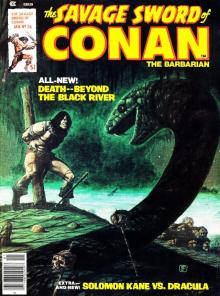 Beyond the Black River
Beyond the Black River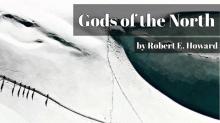 Gods of the North
Gods of the North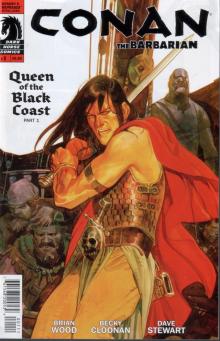 Queen of the Black Coast
Queen of the Black Coast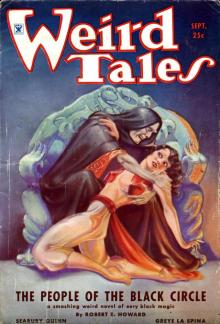 The People of the Black Circle
The People of the Black Circle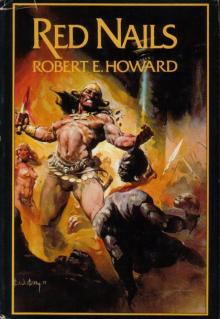 Red Nails
Red Nails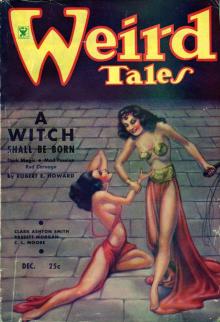 A Witch Shall Be Born
A Witch Shall Be Born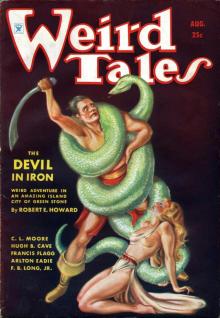 The Devil in Iron
The Devil in Iron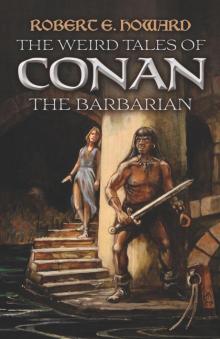 The Weird Tales of Conan the Barbarian
The Weird Tales of Conan the Barbarian The Bloody Crown of Conan
The Bloody Crown of Conan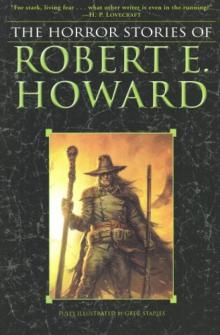 The Horror Stories of Robert E. Howard
The Horror Stories of Robert E. Howard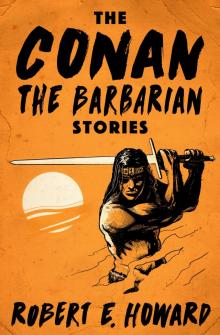 Conan the Conqueror
Conan the Conqueror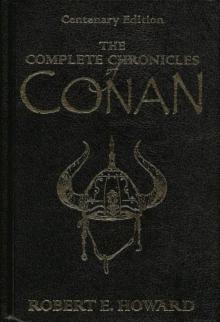 Conan the Barbarian
Conan the Barbarian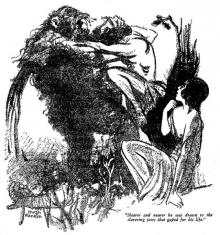 Shadows in the Moonlight
Shadows in the Moonlight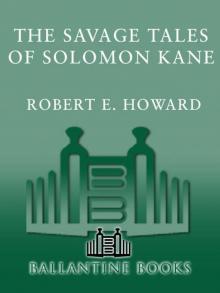 The Savage Tales of Solomon Kane
The Savage Tales of Solomon Kane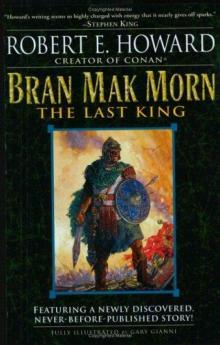 Bran Mak Morn: The Last King
Bran Mak Morn: The Last King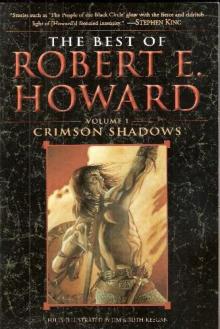 The Best of Robert E. Howard Volume One: Crimson Shadows
The Best of Robert E. Howard Volume One: Crimson Shadows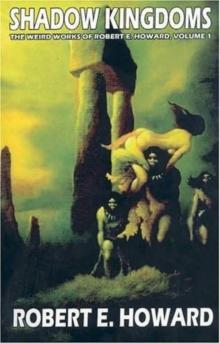 The Best of Robert E. Howard: Crimson Shadows (Volume 1)
The Best of Robert E. Howard: Crimson Shadows (Volume 1) Black Hounds of Death
Black Hounds of Death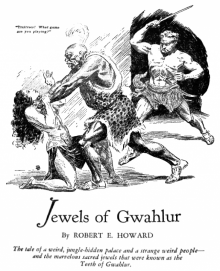 Jewels of Gwahlur
Jewels of Gwahlur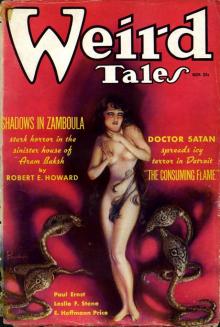 Shadows in Zamboula
Shadows in Zamboula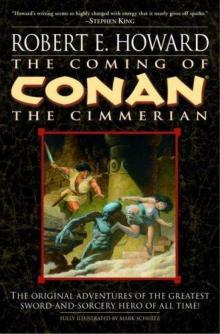 The Coming of Conan the Cimmerian
The Coming of Conan the Cimmerian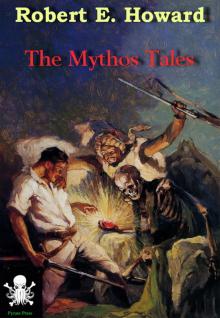 The Mythos Tales
The Mythos Tales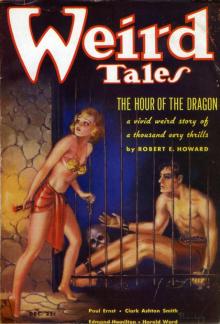 The Hour of the Dragon
The Hour of the Dragon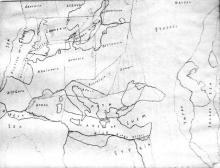 The Hyborian Age
The Hyborian Age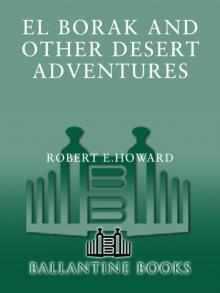 El Borak and Other Desert Adventures
El Borak and Other Desert Adventures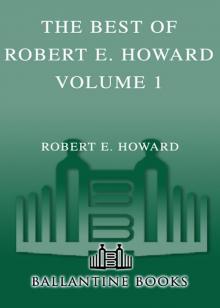 The Best of Robert E. Howard Volume 1 The Best of Robert E. Howard Volume 1
The Best of Robert E. Howard Volume 1 The Best of Robert E. Howard Volume 1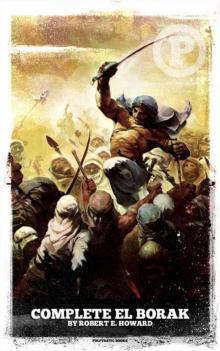 El Borak: The Complete Tales
El Borak: The Complete Tales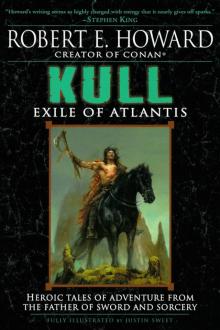 Kull: Exile of Atlantis
Kull: Exile of Atlantis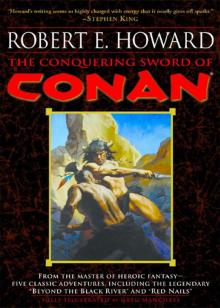 The Conquering Sword of Conan
The Conquering Sword of Conan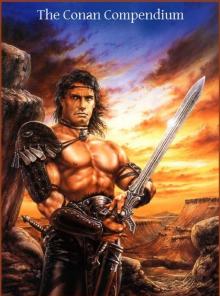 The Conan Compendium
The Conan Compendium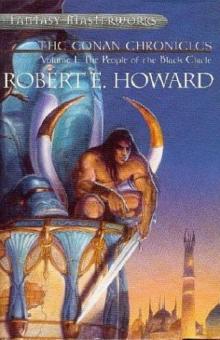 The Conan Chronicles: Volume 1: The People of the Black Circle
The Conan Chronicles: Volume 1: The People of the Black Circle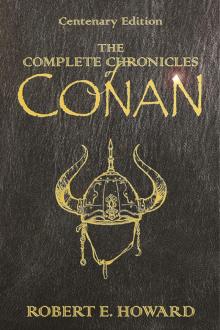 The Complete Chronicles of Conan: Centenary Edition
The Complete Chronicles of Conan: Centenary Edition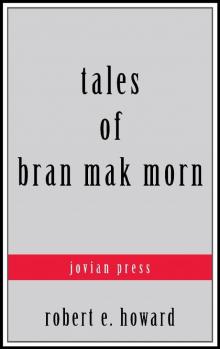 Tales of Bran Mak Morn (Serapis Classics)
Tales of Bran Mak Morn (Serapis Classics)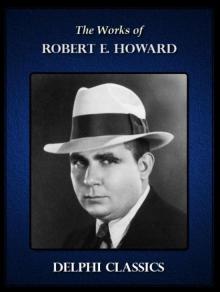 Delphi Works of Robert E. Howard (Illustrated) (Series Four)
Delphi Works of Robert E. Howard (Illustrated) (Series Four)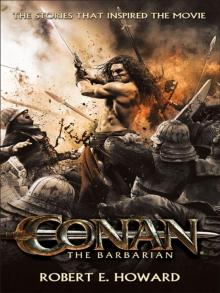 Conan the Barbarian: The Stories That Inspired the Movie
Conan the Barbarian: The Stories That Inspired the Movie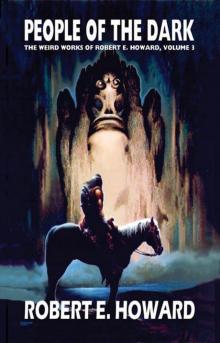 People of the Dark Robert Ervin Howard
People of the Dark Robert Ervin Howard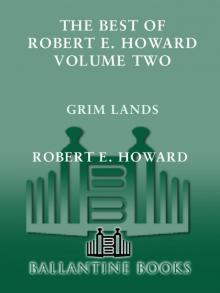 Grim Lands
Grim Lands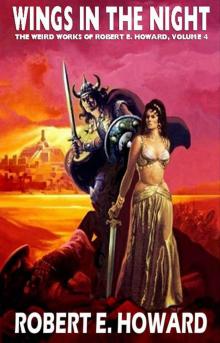 Wings in the Night
Wings in the Night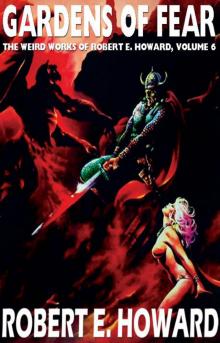 Gardens of Fear
Gardens of Fear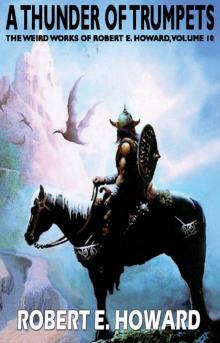 A Thunder of Trumpets
A Thunder of Trumpets Detective of the Occult
Detective of the Occult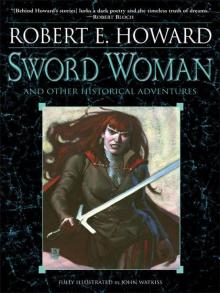 Sword Woman and Other Historical Adventures
Sword Woman and Other Historical Adventures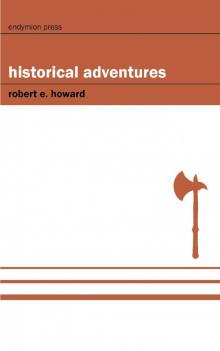 Historical Adventures
Historical Adventures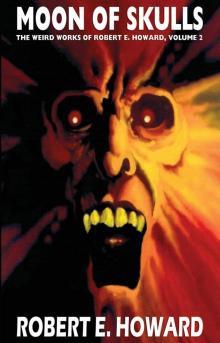 Moon of Skulls
Moon of Skulls The Robert E. Howard Omnibus: 97 Collected Stories
The Robert E. Howard Omnibus: 97 Collected Stories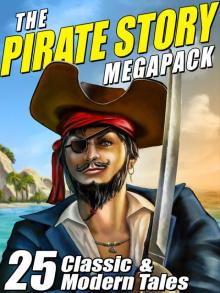 The Pirate Story Megapack: 25 Classic and Modern Tales
The Pirate Story Megapack: 25 Classic and Modern Tales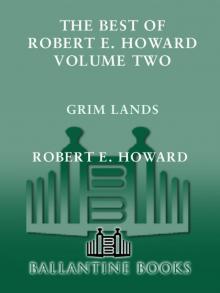 The Best of Robert E. Howard, Volume 2
The Best of Robert E. Howard, Volume 2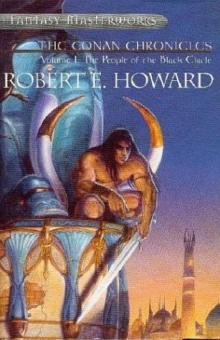 The Conan Chronicles, Vol. 1: The People of the Black Circle
The Conan Chronicles, Vol. 1: The People of the Black Circle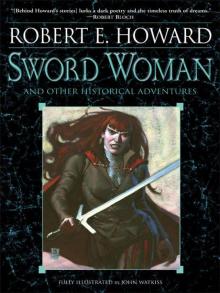 Sword Woman and Other Historical Adventures M
Sword Woman and Other Historical Adventures M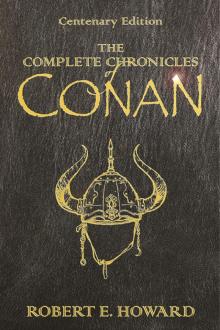 The Complete Chronicles of Conan
The Complete Chronicles of Conan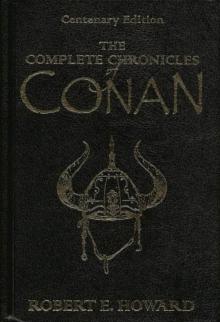 Conan the Barbarian: The Chronicles of Conan (collected short stories)
Conan the Barbarian: The Chronicles of Conan (collected short stories)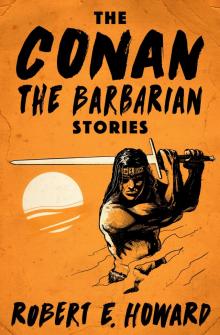 The Conan the Barbarian Stories
The Conan the Barbarian Stories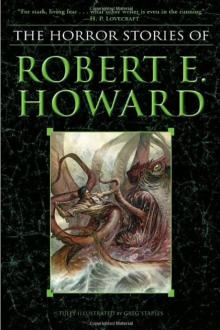 The Best Horror Stories of
The Best Horror Stories of Tigers Of The Sea cma-4
Tigers Of The Sea cma-4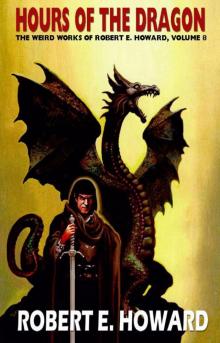 The Hours of the Dragon
The Hours of the Dragon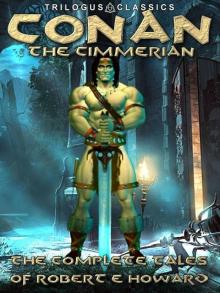 Conan the Cimmerian: The Complete Tales (Trilogus Classics)
Conan the Cimmerian: The Complete Tales (Trilogus Classics)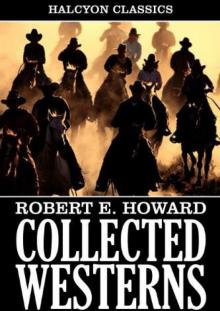 Collected Western Stories of Robert E. Howard (Unexpurgated Edition) (Halcyon Classics)
Collected Western Stories of Robert E. Howard (Unexpurgated Edition) (Halcyon Classics)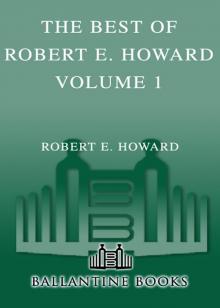 The Best of Robert E. Howard, Volume 1
The Best of Robert E. Howard, Volume 1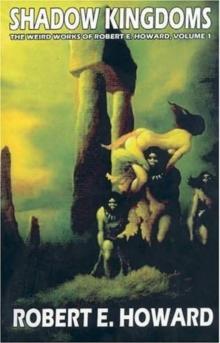 Shadow Kingdoms
Shadow Kingdoms